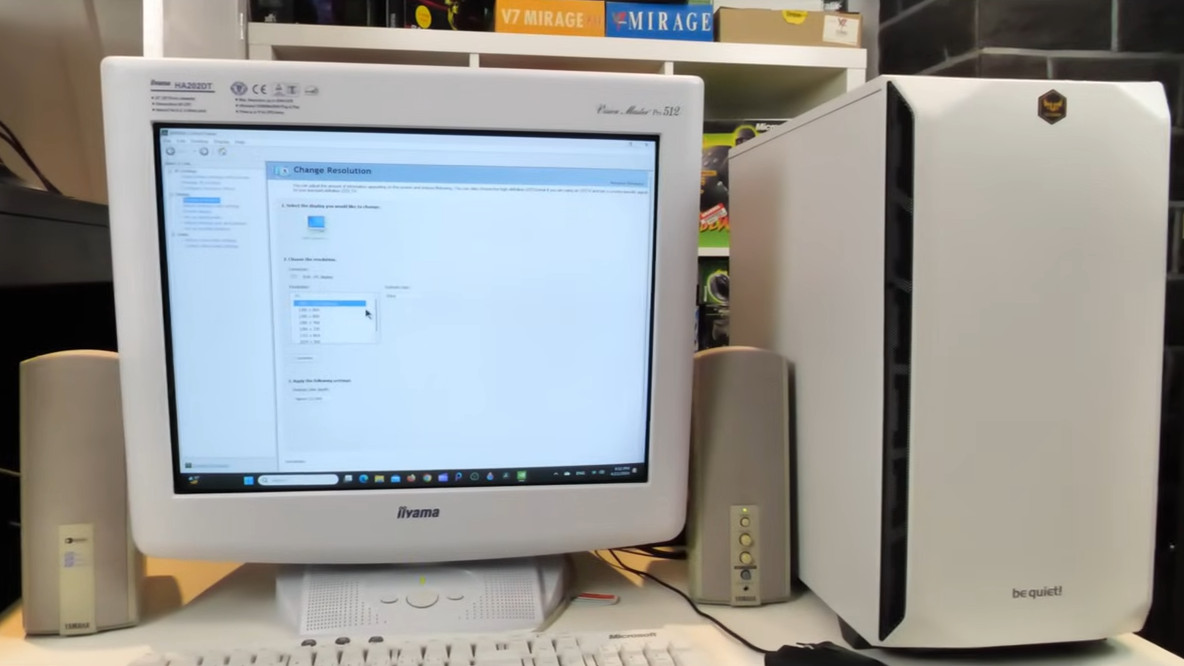Want a 700Hz gaming monitor? Dinosaur CRT display from 2002 has hit this staggering refresh rate, blowing away modern LCDs – with one huge catch
All refresh rate and no resolution...

By now we’re surely all familiar with the refresh rate race in monitors, with ridiculously fast levels pursued these days – but how would you react if we told you an ancient monitor can actually be driven faster than today’s very speediest panels…
And by ancient monitor, we mean a CRT (Cathode Ray Tube) display – you won’t have forgotten these if you ever used them, but if you didn’t, they’re the ones you’ll see in 80s movies that are the size of a small house (well, we exaggerate, but they’re hefty old units).
Rather incredibly, RetroGamingBase on YouTube has a video showing the Iiyama Vision Master Pro512 CRT monitor (from 2002) being pushed to a staggering 700Hz (with previous attempts witnessing 400Hz or 500Hz kind of levels).
At 700Hz, this is 30% faster than the current refresh rate champs, the 540Hz monitors from the likes of Asus and BenQ (ROG Swift Pro PG248QP and Zowie XL2586X respectively). Even modern prototypes only reach 600Hz or so, although there’s one exception more recently in a 1000Hz effort from TCL (in a 4K monitor, no less).
Okay, at this point, you’re thinking – well, what’s the catch? How can a 22-year-old CRT comfortably outgun the best monitors of contemporary times when it comes to refresh rate? Well, the caveat is that the YouTuber dropped the resolution to a rather pathetic 320 x 120. (If you want to get an idea of how blurry that is, head to YouTube, stick on a video, and drop it to 144p quality – and even then, you’re not quite there).
As Tom’s Hardware, which spotted this, points out, any higher than that resolution would have meant that the monitor couldn’t handle the sky-high refresh rate without melting (well – without the image becoming unstable and generally all over the place).
Analysis: Poetry in motion
CRT monitors might look like huge bricks of peripherals (and have the weight of them, too), squatting on your desk and taking the whole space over, but they still make for an impressive display to look at, even these days, in one key respect: motion clarity.
Get daily insight, inspiration and deals in your inbox
Sign up for breaking news, reviews, opinion, top tech deals, and more.
There’s a smoothness to CRT that made us very unwilling to give it up when slim, flatscreen panels were realized – we fiercely looked down our nose at LCDs and their lackluster performance in shooters when they were first introduced.
Of course, it’s a very different story now, but it’s still really eye-opening to see how CRTs can be pushed in this manner – even if the resolution drop is obviously a killer for the overall experience, and in fact you can’t game at this res, or indeed even run Windows 11. The YouTuber is going to try and work around that, using another monitor (a less mint condition one that they don’t mind risking) and an earlier Windows version, to actually try to get a game running at 700Hz – so we’ll keep an eye out for that.
As for the benefit of dizzyingly high refresh rates, well, that’s a controversial topic. However, it’s definitely a case of diminishing returns as you get up towards this kind of stupidly high levels of Hertz (not to mention the difficulty in having a powerful enough gaming PC to drive frame rates that fast). It’s only really serious competitive gamers who need this kind of refresh rate on their monitors, anyway.
Still, as far as experiments go in the computing world, this is one of the more jaw-slackening efforts we’ve seen in recent times. It’ll be really interesting to see if RetroGamingBase can pull off the promised feat of getting a game to actually run at 700Hz on an alternative CRT monitor.
Darren is a freelancer writing news and features for TechRadar (and occasionally T3) across a broad range of computing topics including CPUs, GPUs, various other hardware, VPNs, antivirus and more. He has written about tech for the best part of three decades, and writes books in his spare time (his debut novel - 'I Know What You Did Last Supper' - was published by Hachette UK in 2013).
